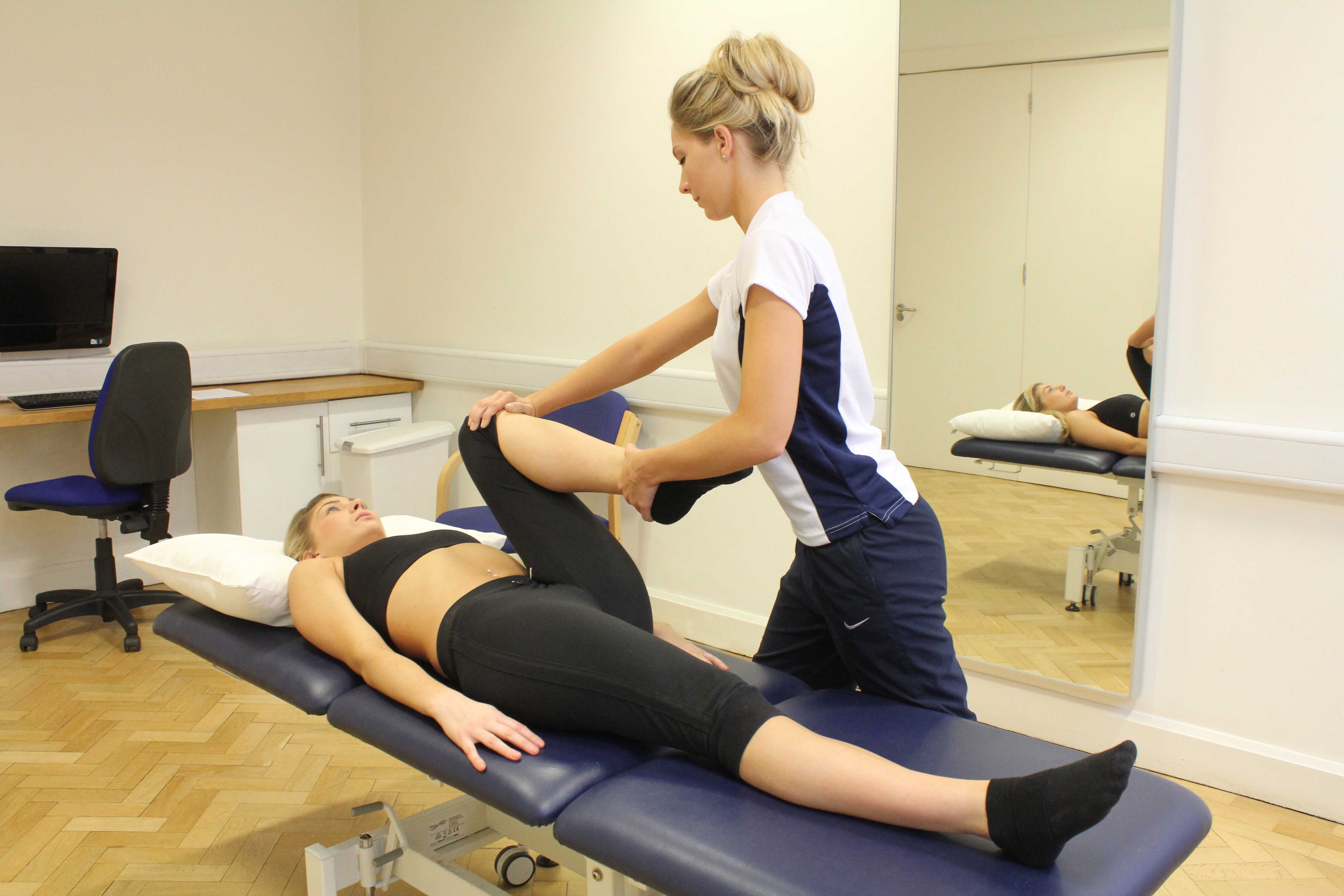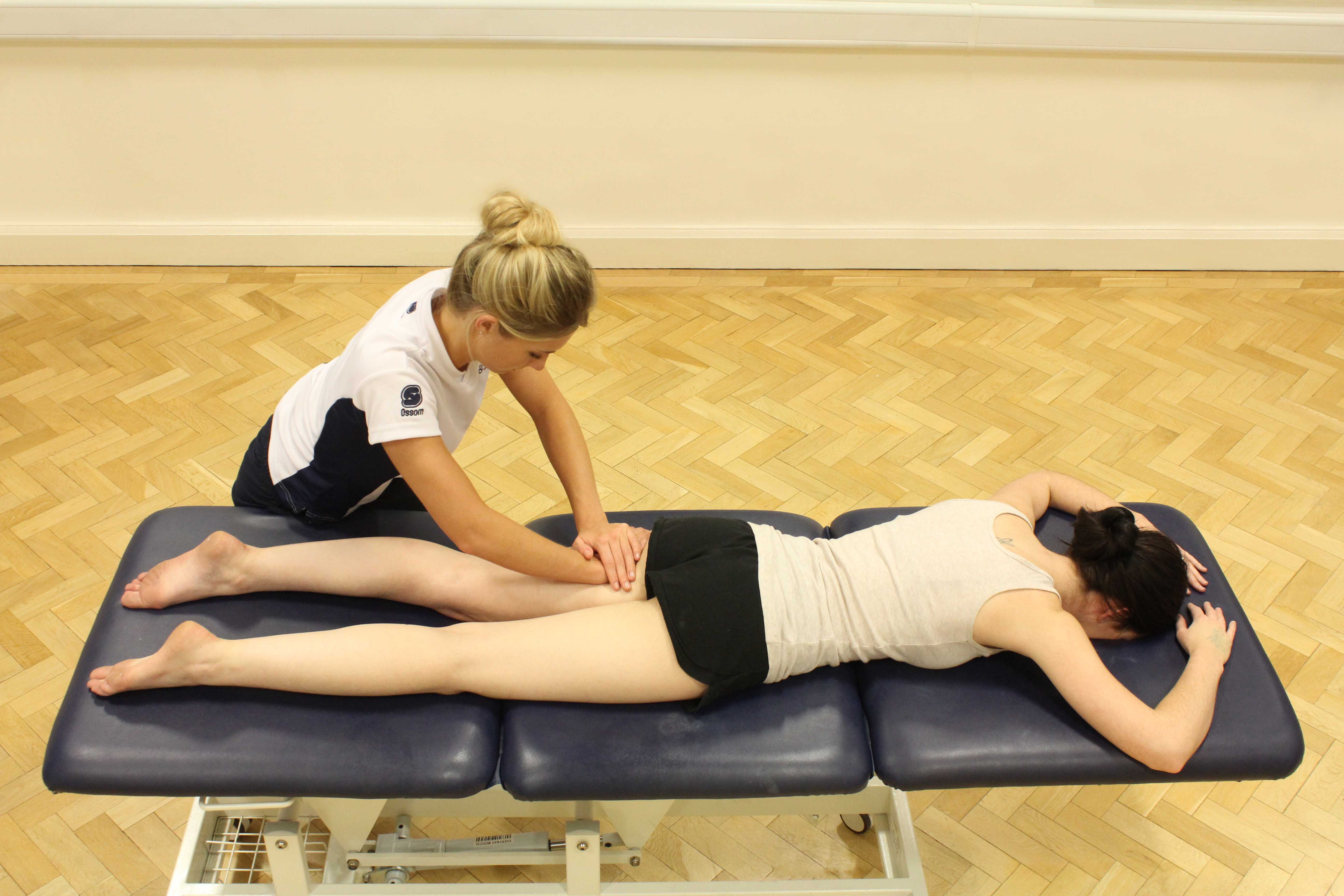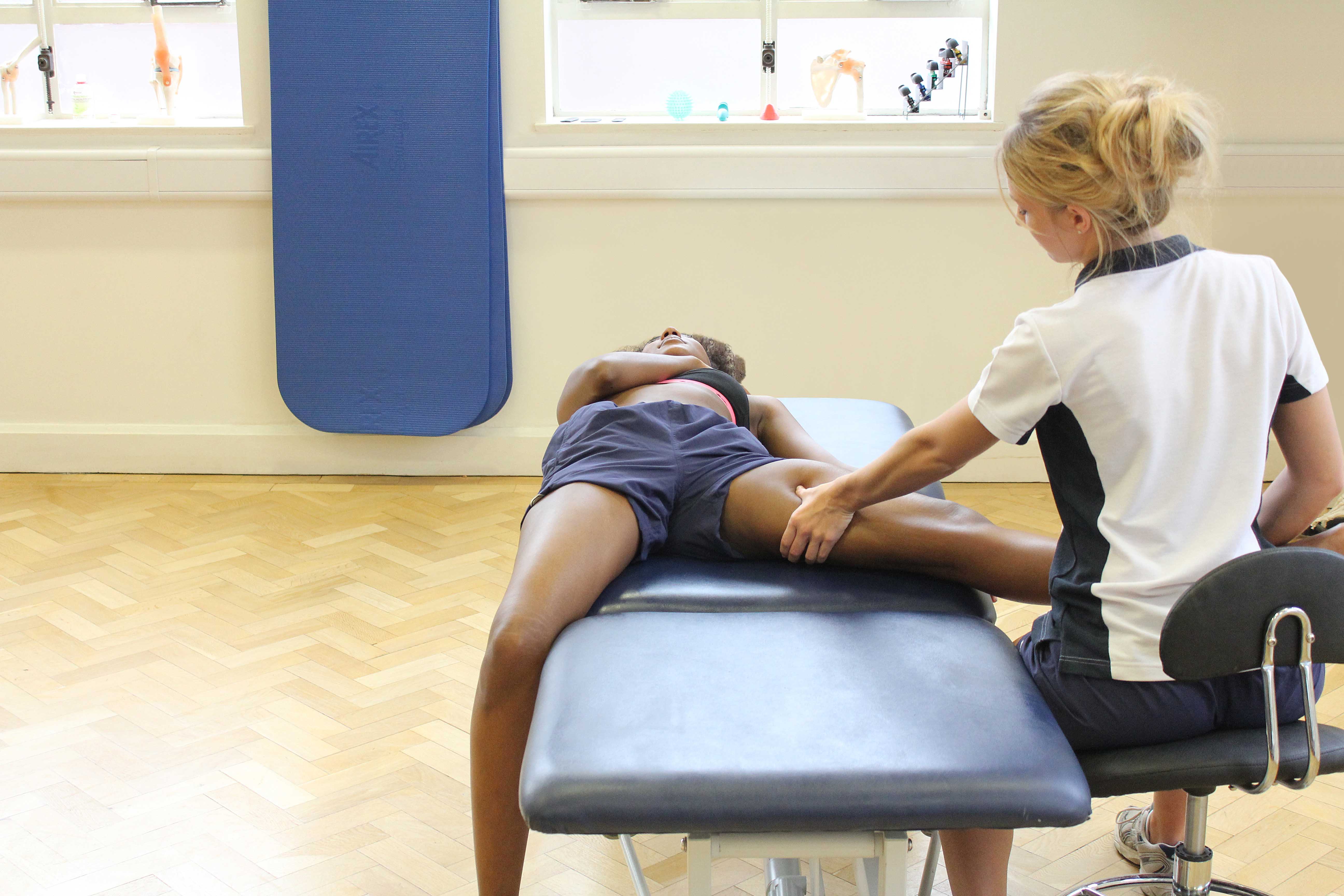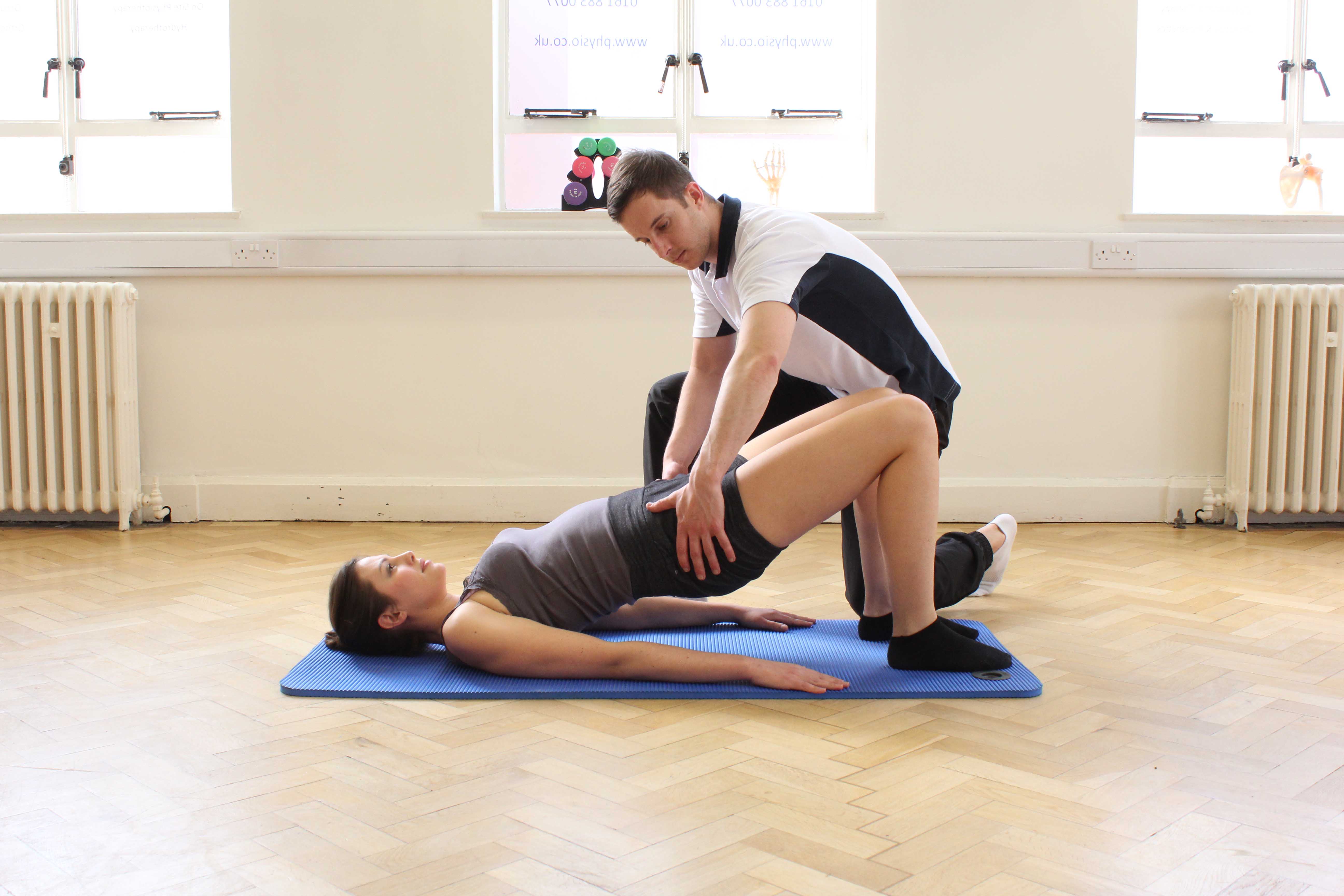Hernia Surgery
A hernia is a protrusion of an organ, or part of an organ, through the tissue or muscle that it is surrounded by. Hernias are caused when excessive pressure is applied to an area of weak muscle which fatigues to its limit causing a protrusion of an organ through this weakened space. Hernias are usually an over use injury, commonly associated with sport players, caused through continuous twisting, sprinting, running and faulty biomechanics. Hernias can also occur through extreme weight lifting and excessive coughing and sneezing.Hernias commonly occur in the abdomen where it is called an abdominal hernia. This occurs when the inner lining of your abdominal wall is torn causing a visible bulge to appear where your organ is protruding.
 Above: Passive stretch of the hip and groin muscles by specialist MSK therapist
Above: Passive stretch of the hip and groin muscles by specialist MSK therapistAbdominal hernias are classed into 2 categories which are:
- Reducible – you able to push your organ back into your abdominal cavity, flattening the hernia or
- Non-reducible – your hernia is unable to be pushed back.
- Inguinal Hernia
- Indirect –here your intestine distends into the internal ring, an inherently weak area of the abdominal wall,and into your scrotum. This commonly occurs in young adults
- Direct – this occurs near to the internal ring. This usually occurs in middle aged men
- Femoral Hernia –this occurs in the femoral canal, a pathway which your femoral artery, vein and nerve run through. Your intestines can bulge into this space if big enough.
- Sportsman Hernia or Gilmores Groin – here this is a tear in the aponeurosis (sheet like tendon)of your external oblique muscle and/or a tear of the internal oblique muscle tendon too. This is not a true herniation and often occurs with an adductor tear.
 Above: Soft tissue massage of the muscles and connective tissues around the groin
Above: Soft tissue massage of the muscles and connective tissues around the groinPhysiotherapy before Hernia Surgery
Before you have surgery, physiotherapy can help to manage your symptoms and allow you to function as best able. However surgery is essential for a full recovery. Hernias are a result of weak abdominal muscles which will cause tight structures to help compensate for this weakness. Physio.co.uk will target these muscles to help relieve tension on your abdominal muscles and limit the severity of your hernia. Physio.co.uk can also aid in preventing hernias from re-occurring. If you are experiencing symptoms which, if left without treatment, could develop into a hernia Physio.co.uk will treat your complaint and develop a strengthening programme to prevent any herniation. Treatment will include:
- Pain management
- Muscle release
- Core stability strengthening programme
- Pelvic stability programme
- Advice and management
Symptoms following Hernia Surgery
Following hernia surgery you will experience common symptoms relative to your procedure. These include:
- Swelling
- Pain
- Stiffness
- Reduced range of movement
 Above: Soft tissue massage of the muscles and connective tissues around the hip and groin
Above: Soft tissue massage of the muscles and connective tissues around the hip and groinPhysiotherapy following Hernia Surgery
Physiotherapy following hernia surgery is a highly important component of rehabilitation. Physiotherapy will not only rehabilitate you following surgery but will help reduce the chance of the hernia re-occurring or complications arising. Physio.co.uk will provide a thorough assessment and a detailed rehabilitation programme centred on your personal goals and requirements.Core stability training plays an important role in preventing injuries through acting as the foundation to movement. Your core provides functional and global stability, absorbing the tensile strength exerted through your muscles during activities and as such will form an integral part of your rehabilitation.
 Above: Strengthening exercises for the hip and pelvic muscles, supervised by MSK therapist
Above: Strengthening exercises for the hip and pelvic muscles, supervised by MSK therapistWeek 1
Initial treatment with Physio.co.uk will centre on reducing inflammation and the integration of early movement to promote optimal recovery following surgery. The retaining of your core stability will be immediately included into your rehab plan. Treatment will include:
- Cryotherapy
- Pain management
- Electrotherapy e.g. TENS
- Soft tissue release
- Core stability training
- Pelvic stability training
- Gentle stretching
- Active and passive movements within pain limits
- Advice and education
Weeks 2
Following your 1st week, Physio.co.uk will advance your rehabilitation to include strengthening and functional based activities. Focus will be on
- Intermediate core strengthening
- Gentle jogging, line running
- Begin abdominal strengthening
- Begin adductor strengthening
Week 3
Physio.co.uk will continue to intensify your rehabilitation adapting your programme to meet your personal needs and rehab progression. There is a strong focus on strengthening and the ability to maintain your core stability throughout movement. Treatment will include:
- Integration of Proprioceptive neuromuscular facilitation (PNF) training.
- Advanced core strengthening
- Abdominal strengthening
- Adductor strengthening
- Progress on to running and sprinting
Weeks 4+
From week 4 Physio.co.uk will intensify your rehabilitation, challenging your limits in order to ensure a timely and effective return to sporting and functional activity. Sport specific rehab will be integrated along with advanced PNF and core stability exercises. Rehabilitation for a Gilmore’s Groin is approximately 4 weeks with femoral and inguinal hernias taking 5 weeks to fully rehabilitate. Treatment will include:
- Advanced PNF training
- Advanced core stability training
- Advanced abdominal and adductor strengthening
- Plyometrics
- Maintenance of tissue length
- Return to sporting and functional activities – running, twisting
- Long term home exercise programme
Summary
An abdominal hernia occurs when part of your bowel pushes through a weakened area of your abdominal wall. This happens as a result of increased pressure and when this is applied to an area of weakened muscle, the muscle fails and an organ protrusion occurs. The main hernia’s that occur are a femoral hernia, inguinal hernia and a sportsman’s hernia commonly known as a Gilmores Groin. In order to correct this, surgery is performed to reverse the protrusion and repair the torn abdominal wall. Following surgery, physiotherapy becomes an essential component of effective rehabilitation and is crucial in providing a return to sport and recurrence prevention. Physio.co.uk provides a comprehensive rehabilitation programme in line with surgical protocols and guided by your personal aims. Call Physio.co.uk now on 0330 088 7800 for more information or to book an appointment please contact us.

 0330 088 7800
0330 088 7800

































